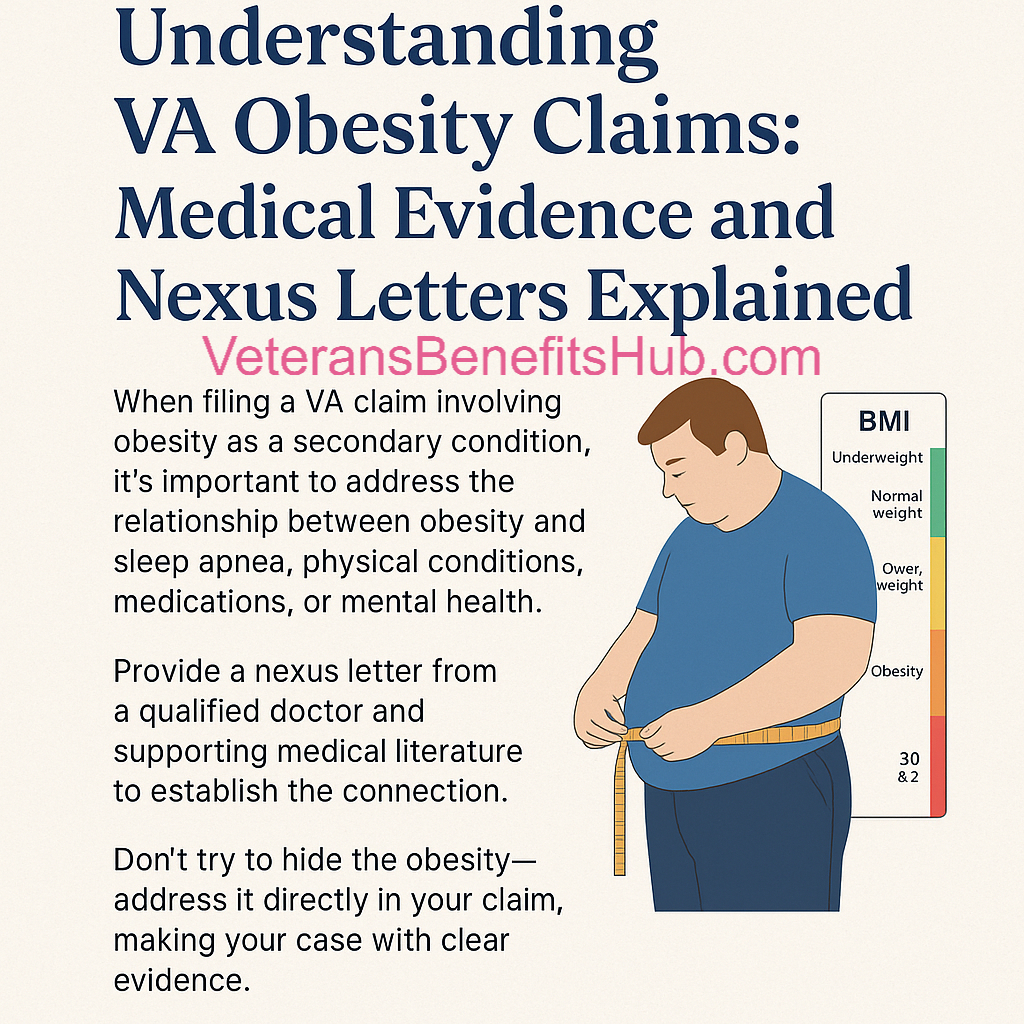
Understanding VA Obesity Claims
When filing a VA claim that involves obesity as a secondary condition—such as claiming that weight gain resulted from service-connected generalized anxiety disorder or lumbosacral strain—it’s important to understand that, per VA regulations, obesity itself is not recognized as a disease or injury. Therefore, it cannot be service-connected on a direct basis.
Obesity cannot qualify as an in-service event because it is a condition that develops over time and is influenced by multiple internal and external factors. It is not considered a discrete incident or series of events, which the VA requires for direct service connection.
Obesity is often cited by the VA in obstructive sleep apnea (OSA) claims. Whether your diagnosis involves OSA, central sleep apnea, or mixed sleep apnea, expect the VA to point to obesity as a contributing factor. While obesity is not a ratable condition by itself, you must address it, because the VA certainly will.
To help quantify obesity, you can use the CDC’s Body Mass Index (BMI) calculator. For example, someone who is 5’9″ and weighs 210 pounds has a BMI of 31, which is classified as obese. While it may be an uncomfortable label, BMI is a standardized measurement the VA considers. A “healthy” weight range for that height is generally between 125 and 169 pounds. It’s common for veterans to gain weight after service, especially with physical limitations or mental health challenges—so if this applies to you, you’re not alone.
Even when you claim your obesity and resulting sleep apnea are secondary to a service-connected condition, such as a lumbosacral strain, the VA may argue that obesity is not caused by inactivity alone. Their rationale often boils down to a claim that obesity stems from personal lifestyle choices and excessive caloric intake, not directly from physical limitations or mental health challenges.
For example, the VA may state there is no medical literature linking back conditions to obesity. Similarly, they may deny any established connection between mental health conditions like generalized anxiety disorder and weight gain. However, many veterans and private doctors would challenge this assumption—there *is* medical literature available, and a private medical opinion may be key to rebutting these denials.
The VA might argue that generalized anxiety disorder and sleep apnea are unrelated, stating that sleep apnea is a distinct medical condition involving physical changes in the airway. Even though mental health disorders and sleep apnea are commonly comorbid, the VA may say there’s no clear medical relationship without strong literature or a compelling nexus letter.
If you’ve ever been denied a sleep apnea claim or are currently in the appeals process, take note of how the VA framed its rationale. Did they cite obesity as the cause? Did they dismiss connections to medications or mental health? Understanding their language and reasoning can help you better prepare future claims.
In many cases, denials hinge on the lack of a nexus—a medical link between your condition and service-connected disabilities. If you don’t provide a strong nexus from a qualified provider, the VA won’t establish one for you. As a result, your claim may be denied with a simple statement like, “A nexus has not been established.”
Don’t file your claim blindly and hope for the best. Especially in complex sleep apnea claims involving secondary connections to mental health or physical conditions, you must provide a detailed nexus letter that connects the dots with supporting medical literature.
The VA may also argue there is no proof that medications for your back or mental conditions—like those prescribed for lumbosacral strain or generalized anxiety disorder—cause excessive weight gain. Again, this is an area where a knowledgeable doctor can help. Certain medications, such as Prozac (an SSRI prescribed for major depressive disorder), are medically known to cause weight gain.
When preparing a claim, your doctor’s opinion becomes critical. You’ll want them to write a medical nexus that states something like: “In my opinion, this veteran’s obstructive sleep apnea was caused or aggravated by the Prozac he takes for his service-connected major depressive disorder.”
This type of language satisfies the VA’s requirement for a nexus, especially when paired with published medical evidence. For example, you can find documentation of Prozac’s side effects, including weight gain, on reputable sources like PubMed or even official drug information inserts. Your doctor can reference these peer-reviewed sources as part of your claim.
The key takeaway is this: do not try to hide the obesity—address it directly. Work with a private doctor who understands how to speak the VA’s language and provide the necessary nexus letter and medical evidence to support your claim. Make sure your claim clearly shows how the medications or service-connected disabilities caused or aggravated your obesity, and how that in turn contributed to your sleep apnea or other claimed conditions.
Disclaimer: Portions of this article contain personal interpretations and opinions based on experiences with VA claims. While efforts were made to ensure accuracy and relevance, readers are encouraged to consult a qualified Veterans Service Officer (VSO), accredited attorney, or medical professional when preparing their own claims.
